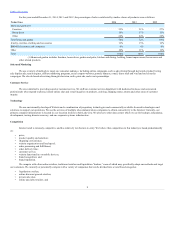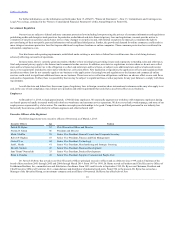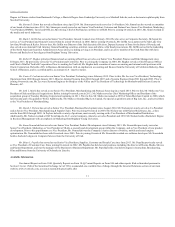Overstock.com 2014 Annual Report Download - page 18
Download and view the complete annual report
Please find page 18 of the 2014 Overstock.com annual report below. You can navigate through the pages in the report by either clicking on the pages listed below, or by using the keyword search tool below to find specific information within the annual report.
Table of Contents
similar laws and others have legislative proposals under consideration. In a case that went up on appeal, an Illinois state court struck down on constitutional
grounds a similar Illinois statute, and the Illinois Supreme Court has upheld that decision. If such laws survive constitutional challenge, we may elect to
discontinue in those states valuable marketing through the use of affiliates based in those states, or may begin to collect taxes in those states. In either event,
our business could be harmed. Further, our business could be harmed if one or more states or any foreign country successfully asserts that we should collect
sales or other taxes on the sale of our merchandise.
The United States Senate passed the Marketplace Fairness Act of 2013 (“MFA”), but it failed to pass in the United States House of Representatives.
There continue to be efforts to revive and pass MFA or MFA-type legislation in the current Congress. MFA or MFA-type legislation would permit qualifying
states to force remote sellers like us to collect taxes in states where we have no physical presence. If the MFA or MFA-type legislation becomes law, our
business could be harmed.
Other states have enacted forms of economic taxes to which we may be subject. We have been subject to and in the past contested an audit by one
such state of an economic tax assessment and settled the audit demand by payment of a diminished assessment without penalty or interest. Other businesses
have contested the constitutionality of these economic taxes, but these challenges are not yet concluded. If other states enact and commence enforcement of
similar commercial activity tax laws, these could harm our business.
Several other states have enacted laws requiring remote vendors to notify resident purchasers in those states of their obligation to pay a use tax on
their purchases and, in some instances, to report untaxed purchases to the state tax authorities. In Colorado, a federal court on constitutional grounds granted
a preliminary injunction against the state’s enforcement of its tax-notice and reporting law. Colorado appealed, and the injunction was overturned on
jurisdictional grounds. The ruling is being appealed to the United States Supreme Court, and the plaintiff has also commenced an action in Colorado state
court, challenging the law. The Colorado state court has issued a preliminary injunction suspending the law's enforcement on constitutional grounds. In
February 2014, another bill was introduced in the Colorado House of Representatives that would require retailers without a physical presence in Colorado to
collect and remit state sales taxes if they engage in any activity in connection with the selling, leasing or delivery of tangible personal property or taxable
services within the state. Other states have enacted similar legislation and more states may enact these laws, or other laws to force or encourage through
economic pressures remote retailers to collect and remit sales tax, despite constitutional prohibitions. Such laws could harm our business by imposing
unreasonable notice burdens upon us, by interposing burdensome transaction notices that negatively affect conversion, or by discouraging customer
purchases by requiring detailed purchase reporting.
Economic pressure on states could harm our business.
Economic circumstances affecting many states have increased the pressures on state legislatures and agencies to find ways to increase state revenues.
States may continue to increase sales and use tax rates, create new tax laws covering previously untaxed activities, increase existing license fees or create new
fees, any or all of which may directly or indirectly harm our business. Similarly, administrative agencies may apply more rigorous enforcement efforts or take
aggressive positions respecting the laws they administer, especially if the laws permit the imposition of monetary penalties and fines which either the state or
the administrative agency may use to balance their budgets or otherwise fund operations. Any of these activities could directly or indirectly harm our
business.
If we do not respond to rapid technological changes, our services could become obsolete, and we could lose customers.
The Internet and the online commerce industry are changing rapidly. To remain competitive, we must continue to enhance and improve the
functionality and features of our e-commerce businesses. If we fail to do so, we may lose customers. If competitors introduce new products or services using
new technologies or if new industry standards and practices emerge, our Website and our proprietary technology and systems may become obsolete. Our
failure to respond to technological change or to adequately maintain, upgrade and develop our computer network and the systems used to process customers’
orders and payments could harm our business.
We have an evolving business model, which increases the complexity of our business.
Our business model has evolved in the past and continues to do so. In prior years we have added additional types of services and product offerings
and in some cases we have modified or discontinued those offerings. We intend to continue to try to offer additional types of products or services, and we
cannot offer any assurance that any of them will be successful. From time to time we have also modified aspects of our business model relating to our product
mix and the mix of direct/partner sourcing of the products we offer. We may continue to modify this aspect of our business as well as other significant aspects
of our business. We cannot offer any assurance that these or any other modifications will be successful or will not result in harm to
18
























